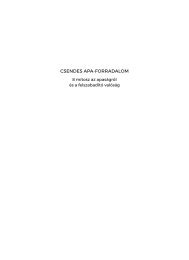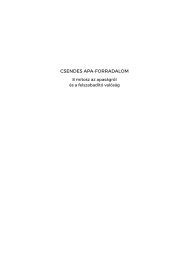Csaba Lentner - East of Europe, west of Asia
You also want an ePaper? Increase the reach of your titles
YUMPU automatically turns print PDFs into web optimized ePapers that Google loves.
2.2 Economic aspects and effects of the Austro-Hungarian Compromise of 1867 | 31
if the exchange of notes is three times unsuccessful, hold a joint meeting for
voting; to deputations, this institution, more acceptable politically rather
than legally, has not been extended. It is undeniable that the procedure is
thus cumbersome, but at least is not publicly objectionable.” 97
Section 18 of Act XII of 1867 stipulated that the proportion by which the
countries of the Hungarian Crown provide the cover of joint tasks on the
basis of sanctio pragmatica should be determined by mutual agreement. The
same law also outlined the way in which the Hungarian Crown and the rest
of the countries of the emperor would choose similar number of delegates
to conduct the negotiations. These two delegations developed their proposal
with the involvement of the ministries, which were then submitted to the
relevant parliaments, which, after negotiations, presented the agreement in
the form of a law to the emperor for enactment. The (rate of) contribution
to the common issues was basically adjusted to the tax burden of the countries.
“However, the question of determining the ratio is so vital that we
cannot be surprised that this principle is often confining in the delegations’
negotiations” 98 – writes Zergényi. An objective definition of the ratio was
proposed on the Austrian side, which was rejected by the Hungarian party,
but the issue has kept on coming about. In contrast to the otherwise logical
Austrian position, the Hungarian delegation repeatedly argued that “Section
22 of Act XII of 1867 states explicitly that the agreement to be made on
the ratio may only last for a definite period of time, after which the place of
a new agreement shall be made in the same way. So the ratio is always the
subject of a free bargain, limiting its freedom is forbidden in any form. The
legal nature of the relationship between the two states would not either allow
binding the freedom of ratio determination. Hence financial independence
is the strongest support for legal independence, and the weakening of one
also affects the other.” 99
Zergényi also describes if there would be no agreement, then it is outlined
in Austrian law that the “intervening” sovereign’s coercive measure can only
last for one year, and can only apply to the Austrian Hereditary Lands. However,
this provision was not included in the Hungarian law. The Hungarian
estates were of the opinion that this law of the sovereign, even in this limited
form, was a matter of concern for parliamentarism, as the budgetary law of
the two states would suffer. Some mitigating circumstance was that the sovereign’s
possible interference could be easily avoided by the two assemblies
if the sovereign would temporally “motu proprio” retain the previously held
rate. The sovereign did not exercise this right until 1877, the public law explanation
of which was that the sovereign for the Hereditary Lands was the
Austrian Emperor, while it was the King of Hungary in St Stephen’s empire,
and the two offices were the same, but legally embodied in one sovereign.
According to Zergényi 100 interventions in this budget reconciliation process
“would not otherwise allow such far-reaching consequences”. At the time of
the Compromise, many of the anomalies resulting from the negotiation pro-





